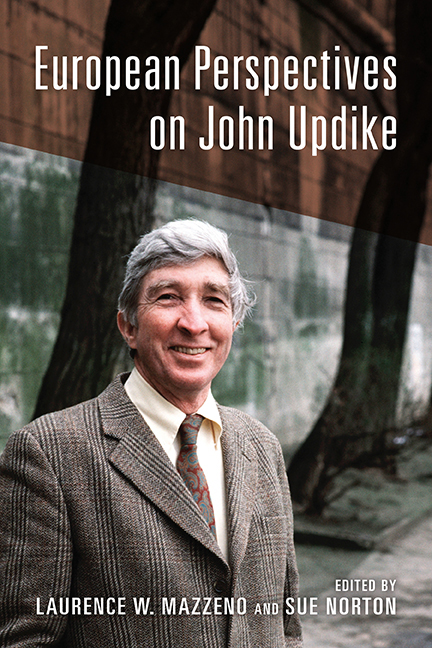Book contents
- Frontmatter
- Contents
- Acknowledgments
- List of Abbreviations
- Introduction: Updike as Europeans See Him
- Part I Coming of Age, Aging in Time
- Part II Love, American Style
- 4 Back to the Garden: American Longing in John Updike's Couples
- 5 Women in John Updike's Villages: Back to the Madonna and Whore
- 6 The Art of Love: Pierre Bourdieu, Cultural Production, and Seek My Face
- Part III Amazing Grace, American Faith
- Part IV Old World Myths, New World News
- Sources for Further Study
- Notes on the Contributors
- Index
6 - The Art of Love: Pierre Bourdieu, Cultural Production, and Seek My Face
from Part II - Love, American Style
Published online by Cambridge University Press: 15 August 2018
- Frontmatter
- Contents
- Acknowledgments
- List of Abbreviations
- Introduction: Updike as Europeans See Him
- Part I Coming of Age, Aging in Time
- Part II Love, American Style
- 4 Back to the Garden: American Longing in John Updike's Couples
- 5 Women in John Updike's Villages: Back to the Madonna and Whore
- 6 The Art of Love: Pierre Bourdieu, Cultural Production, and Seek My Face
- Part III Amazing Grace, American Faith
- Part IV Old World Myths, New World News
- Sources for Further Study
- Notes on the Contributors
- Index
Summary
Introduction
TWO WOMEN, both active agents in the art world, meet in Vermont on a single day in April for an interview. Kathryn D'Angelo is an aspiring twenty-seven-year-old art historian, critic, and cyberjournalist from New York. Her interviewee is Hope Chafetz, born Ouderkirk, a life-obsessed, seventy-nine-year-old widow, abstract painter, and the former wife of two famous postwar American artists and one art collector. Through their fictional encounter evolves Seek My Face. With the title of this often overlooked twentieth novel of “America's Man of Letters” (Pritchard 2000), John Updike draws on Psalm 27 from the Old Testament—“You speak in my heart and say, ‘Seek my face.’ Your face, Lord, will I seek”—which he includes as the prefatory inscription. Some critics have focused on the role of God in the ensuing 276-page interview that makes up the novel. However, as Andrew Tate (2008) rightly asserts, God “seems to be defined by his absence” (44) in this novel. And in the view of Thomas M. Dicken (2004), in Seek My Face it is art that addresses this absence, because “art—and its cousins, color and beauty—provide a way of seeking God's face that hymns life” (79). Hope herself was raised as a Quaker; her initial perception of the artist, as a category of human occupation, emphasizes this view of the artist as a seeker of divinity. In one striking passage she says: “to make art was the highest and purest of human activity, the closest approach to God, the God who creates Himself in this push and pull of colors” (38).
As the novel unfolds, though, the reader is reminded that art, despite any of its spiritual possibilities, most definitely occupies our material world. It is not just a pure and sublime pursuit. It is also part of cultural production and cultural life, and it is inevitably situated within a specific intellectual and practical context where power is symbolically created and relegitimized. As Hope's experiences have shown her, this creation and relegitimization happens through “dealers and buyers” as well as through agents, supporters, institutions, museums, and funding programs such as the Federal Arts Project (SMF, 16) in a solidly male-dominated environment.
- Type
- Chapter
- Information
- European Perspectives on John Updike , pp. 90 - 102Publisher: Boydell & BrewerPrint publication year: 2018



